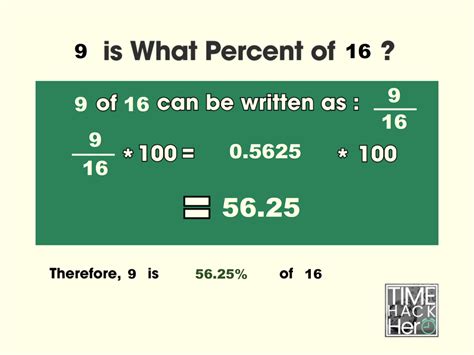9 Is What Percent Of 16
News Leon
Mar 28, 2025 · 4 min read

Table of Contents
9 is What Percent of 16? A Comprehensive Guide to Percentage Calculations
Understanding percentages is a fundamental skill in various aspects of life, from calculating discounts and taxes to analyzing data and understanding statistics. This article delves into the question, "9 is what percent of 16?", providing a detailed explanation of the calculation process, different methods to solve it, and practical applications to solidify your understanding.
Understanding Percentages
A percentage is a fraction or ratio expressed as a number out of 100. It represents a portion of a whole. The symbol "%" represents "percent." For example, 50% means 50 out of 100, which is equivalent to 1/2 or 0.5.
Calculating "9 is What Percent of 16?"
The core question we're addressing is how to determine what percentage 9 represents when compared to 16. There are several ways to approach this calculation:
Method 1: Using the Formula
The fundamental formula for calculating percentages is:
(Part / Whole) * 100% = Percentage
In our case:
- Part: 9
- Whole: 16
Substituting these values into the formula:
(9 / 16) * 100% = 56.25%
Therefore, 9 is 56.25% of 16.
Method 2: Setting up a Proportion
Another effective method involves setting up a proportion:
9/16 = x/100
Here, 'x' represents the percentage we need to find. To solve for 'x', we cross-multiply:
9 * 100 = 16 * x
900 = 16x
x = 900 / 16
x = 56.25
Again, we find that 9 is 56.25% of 16.
Method 3: Using Decimal Conversion
We can also convert the fraction 9/16 into a decimal and then multiply by 100% to obtain the percentage.
9 divided by 16 equals 0.5625.
Multiplying 0.5625 by 100%, we get 56.25%.
This confirms that 9 is 56.25% of 16.
Practical Applications of Percentage Calculations
Understanding percentage calculations is crucial in numerous real-world scenarios:
1. Discounts and Sales
Stores frequently advertise discounts as percentages. If a $20 item is discounted by 25%, you can calculate the discount amount and the final price using percentage calculations.
2. Taxes and Interest
Taxes and interest are often expressed as percentages. Calculating the tax amount on a purchase or the interest accrued on a loan requires understanding percentage calculations.
3. Grade Calculation
In education, grades are often expressed as percentages. Calculating your overall grade in a course involves determining the percentage of marks obtained.
4. Data Analysis and Statistics
Percentages are frequently used in data analysis to represent proportions, trends, and changes. Understanding percentages is essential to interpreting data effectively.
5. Financial Planning
Percentages play a vital role in financial planning, from calculating savings rates to analyzing investment returns.
6. Real Estate
Percentage calculations are essential for understanding things like property tax rates, commission rates for real estate agents, and loan-to-value ratios.
7. Science and Engineering
In fields like chemistry and physics, percentage calculations are often used to express concentrations or compositions.
Beyond the Basics: Advanced Percentage Concepts
While the basic percentage calculation is straightforward, understanding more advanced concepts can significantly enhance your problem-solving abilities:
1. Percentage Increase and Decrease
Calculating percentage increases or decreases requires understanding the initial value and the change in value. For example, if a quantity increases from 10 to 15, the percentage increase is calculated as follows:
(Increase / Original Value) * 100% = Percentage Increase
(5 / 10) * 100% = 50%
Similarly, if a quantity decreases, the calculation is the same, but you'll end up with a percentage decrease.
2. Percentage Change
The percentage change is often used to compare two values over time or across different groups. It's calculated by:
((New Value - Old Value) / Old Value) * 100%
This can be a positive number (percentage increase) or a negative number (percentage decrease).
3. Compound Interest
Compound interest involves earning interest on both the principal amount and accumulated interest. Understanding compound interest is crucial for long-term financial planning. The formula is more complex but leverages fundamental percentage concepts.
Troubleshooting Common Percentage Calculation Errors
Several common mistakes can lead to inaccurate percentage calculations:
- Incorrect Formula Application: Ensure you're using the correct formula (Part / Whole) * 100% and applying it accurately.
- Decimal Point Errors: Carefully handle decimal points during calculations to avoid rounding errors.
- Unit Inconsistency: Make sure all units (currency, quantities, etc.) are consistent throughout the calculation.
- Misinterpretation of the Problem: Thoroughly understand the question to avoid misinterpreting the "part" and the "whole."
Practicing Percentage Calculations
The best way to master percentage calculations is through practice. Work through various examples, varying the values and complexities of the problems. Use online calculators and resources to verify your answers and identify any areas where you need further improvement.
Conclusion
Mastering percentage calculations is a valuable skill applicable in numerous real-world situations. By understanding the fundamental formula, different calculation methods, and the practical applications of percentages, you'll enhance your analytical skills and problem-solving abilities. Remember to practice consistently to build confidence and accuracy in your calculations. This comprehensive guide provides a solid foundation for confidently tackling percentage problems, from the simple to the more advanced. With consistent practice and a grasp of the core concepts, you’ll become proficient in handling any percentage calculation you encounter.
Latest Posts
Latest Posts
-
The Measure Of An Acute Angle 90
Mar 31, 2025
-
3x 2y 12 In Slope Intercept Form
Mar 31, 2025
-
Which Type Of Muscle Tissue Is Multinucleated
Mar 31, 2025
-
True Or False Evaporation Is A Physical Change
Mar 31, 2025
-
Do Gram Positive Bacteria Have Porins
Mar 31, 2025
Related Post
Thank you for visiting our website which covers about 9 Is What Percent Of 16 . We hope the information provided has been useful to you. Feel free to contact us if you have any questions or need further assistance. See you next time and don't miss to bookmark.
